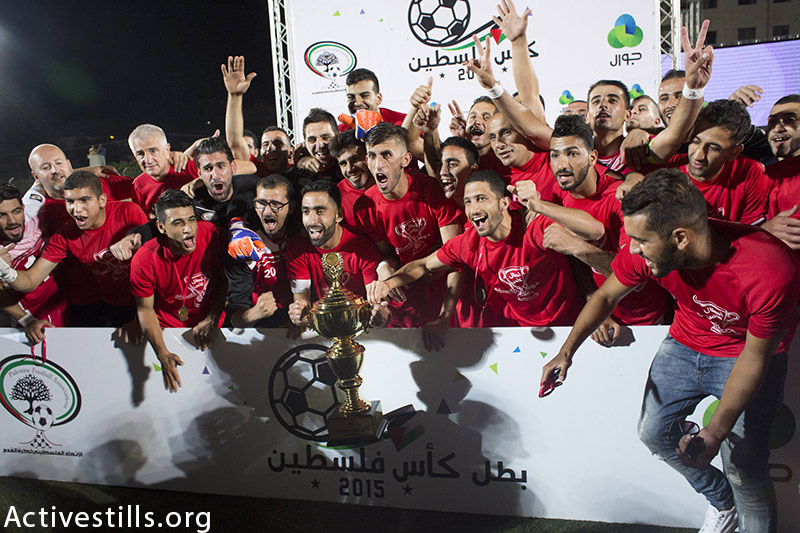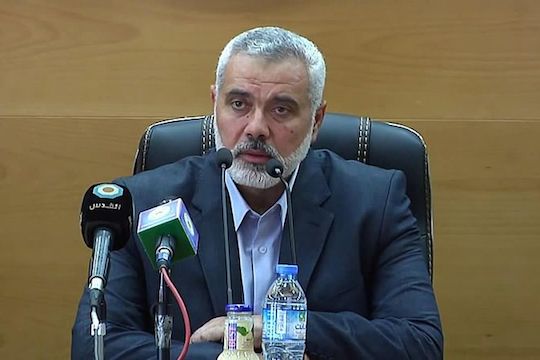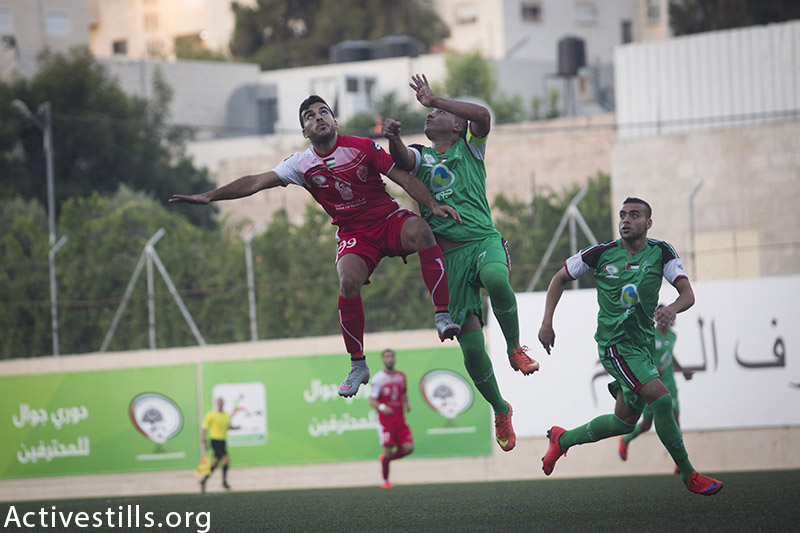This year’s Palestine Cup, the biggest sporting event in the Palestinian territories, pits Hebron’s Ahly al-Khalil against Shabab Khan Younis. Could reconciliation on the field pave the way for national reconciliation?
By Yoni Mendel

One of Jibril Rajoub’s greatest achievements as the Chairman of the Palestinian Football Association, if not the greatest, took place a year ago. For the first time since the Second Intifada, Rajoub renewed the tradition in which the winner of the Palestine Cup in the West Bank plays against the winner in Gaza.
This occurred after Palestinian representatives in FIFA threatened to vote in favor of boycotting Israel and expelling the country from the organization. Eventually, instead of voting to kick Israel out, they decided to reach a compromise according to which a special FIFA committee — comprised of international, Israeli, and Palestinian representatives — will be responsible for ensuring that Israel does not get in the way of issues related to Palestinian soccer. These circumstances allowed for the Palestine Cup between Gaza and the West Bank to take place last year for the first time since 2000.
The match is bigger than the sum of its parts. After all, the West Bank and the Gaza Strip represent two parts of Palestine between which there is very little movement. They represent two Palestinian leaderships in conflict. They represent two parts of the Palestinian people, which haven’t had an election in over a decade. They represent two forms of Israeli control over the lives of Palestinians — occupation here, siege there.
For these reasons the match has become the most important sports event in the Palestinian calendar. The game is also an opportunity for both PA President Mahmoud Abbas and Hamas leader Ismail Haniyeh to prove their leadership. Thus the players of both teams must prepare for a round of speeches and receptions, as both sides try to display their control and the legitimacy of their rule.

This year’s match will be between Hebron’s Ahly al-Khalil ,which defeated Hilal al-Quds to reach the final match, and Shabab Khan Younis from Gaza. On paper, Ahly al-Khalil is a far stronger team; they won last year’s cup (the first Palestinian team that is able to hold on to the trophy two years in a row), and is one of the strongest clubs in the league.
Shabab Khan Younis defeated Shabab Jabaliya in the Gaza Cup final. The team hasn’t won a league championship in 15 years, and this year they managed to win the cup despite a relatively average showing (this year’s championship went to Khadmat Rafah).
The first match of the cup will take place on Tuesday in Gaza’s Al-Yarmouk Stadium, and will be followed by another game in Hussein Bin Ali Stadium in Hebron on Saturday.
Despite their disadvantage, the Gazans are preparing for the match with utmost seriousness. For them, a win will mean more than simply moving on to the Asia Cup — it will have national ramifications for Gaza itself. For these reasons, according to the Al-Ayyam daily, the conditions of Shabab Khan Younis’ training camp is as good as Gaza can offer, and the players are feeling determined.

Furthermore, in order to best prepare the team, Shabab Khan Younis will play a friendly match against the “Gaza Strip Stars,” lead by captain of the Palestinian national team, Abdel Latif Al-Bahdari. In order to increase motivation, Vice Chairman of the Palestinian Football Association Abdel Salam Haniyeh, the son of the Hamas leader, came to the practice to wish the players luck.
Ahly al-Khalil is also doing everything it can to prepare its players for the match. Coach Ayman Sandufa told the Al-Quds daily that the players practice twice a day, once in the morning and once in the evening, in order to improve their fitness and mental preparation.
The question of reconciliation
The very fact that this match is taking place is a cause for excitement, and not only because it will be a historic visit for each team to visit Gaza and the West Bank (Ahly al-Khalil have already announced that its delegation will include no less than 33 players and staff members, headed by club chairman Kifah al-Sharif). The Hebronites graciously thanked their Gaza hosts who put them up in the Commodore Hotel, located on Gaza City’s beach.
Jamil al-Sa’adouni, the chairman of Shabab Khan Younis, is also excited by the match, specifically by the opportunity to travel to Hebron. In a recent interview he said his team is hoping to properly represent athletics in Gaza in the best way possible. However, Sa’adouni also added that his biggest concern is not from inter-team rivalry, but from the possibility that Israel may try to prevent the match from taking place. “We are aware of the difficulties Israel may create at Erez Crossing as the Gaza delegation tries to leave for the West Bank, including using technicalities to prevent players or staff members from crossing, and thus we are contact with all the relevant parties, including FIFA,” Sa’adouni said.
Between declarations made by Abbas and those of Haniyeh we can expect to see some soccer. But the question of whether reconciliation on the soccer field will pave the way for Palestinian reconciliation, which is so necessary for the Palestinian struggle for independence, will be on everyone’s mind.
Yoni Mendel is the projects manager of the Mediterranean Unit at the Van Leer Jerusalem Institute, and co-editor of the book review section of the Journal of Levantine Studies (JLS). This article was first published in Hebrew on Local Call, where he is a blogger. Read it here.

